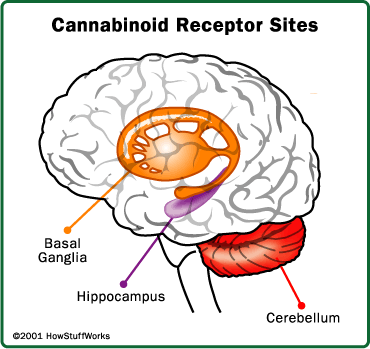March 12, 2015 Nancy Sajben, MD, forwards a meant-to-frighten story from the Daily Mail based on a paper just published in Hippocampus by psychiatrists at Northwestern University.
The headline and subhead:
Smoking cannabis for three years in your teens can ruin long-term memory: Using drug daily changes shape of part of the brain linked to recall
- Participants in study who smoked drug daily for around three years had abnormally shaped hippocampus brain region which is vital to memory
- They also performed around 18 per cent worse in long-term memory tests than individuals who had never touched cannabis
- Results were uncovered using sophisticated brain-mapping scans taken two years after participants stopped smoking cannabis
From the piece by the Daily Mail’s Medical Correspondent Jenny Hope:
The results were uncovered using sophisticated brain-mapping scans taken two years after they stopped smoking cannabis.
Professor John Csernansky, from Northwestern University in the US, who co-led the research, said: ‘The memory processes that appear to be affected by cannabis are ones that we use every day to solve common problems and to sustain our relationships with friends and family.’
The study is one of the first to suggest that abnormally shaped brains in heavy cannabis users are directly related to memory impairment.
The longer a participant had been exposed to cannabis the more misshapen their hippocampus appeared on scans.
This could mean brain regions related to memory may be more susceptible to the effects of the drug the longer the abuse occurs…
The caption on an accompanying photo of a Cannabis plant declared: “Everyday memory processes can be affected by using the drug in your teens.” Note how the implication of a very small (97-patient) study becomes established fact in the corporate media. Science Daily’s headline was: “Teen cannabis users have poor long-term memory in adulthood.”
How solid was the study itself? O’Shaughnessy’s has requested a copy of the paper in Hippocampus. For now we have the Science Daily summary (based on a release from Northwestern Medicine), which tells us:
“A total of 97 subjects participated, including matched groups of healthy controls, subjects with a marijuana use disorder, schizophrenia subjects with no history of substance use disorders, and schizophrenia subjects with a marijuana use disorder.”
That might seem like a very small database, but don’t worry, technology will save us:
Lei Wang, a senior author of the study and assistant professor of psychiatry and behavioral sciences at the university, said: ‘Advanced brain mapping tools allowed us to examine detailed and sometimes subtle changes in small brain structures.’
Especially reassuring is the word “advanced.” —FG





